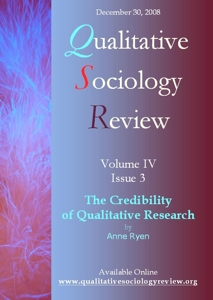Narratives in Illness: A Methodological Note
DOI:
https://doi.org/10.18778/1733-8077.4.3.04Keywords:
Narrative, Methodology, Identity, Performance, Ethnography, Video analysisAbstract
As a result of the general growth in the interest in narratives different conception of what a story is and how to analyze has emerged. One especially interesting and methodological relevant difference is between the conception of narratives as textual objects and narratives as part of a storytelling event. The paper discusses the theoretical differences between these two analytical approaches to narratives. An example from my own research on Alzheimer’s patients telling stories illustrate the possibilities of using a performative and micro ethnographic approach to the study of storytelling in order to understand the functions of narratives – especially in relation to identity work. If stories not only are thought of as representations of events it becomes possible to view stories and story telling as social action: social states are both established, negotiated and changed through stories. This is especially important in the field of health and illness where diseases almost always are embedded in conversations and the telling of why and how symptoms were discovered or traumas received. For many patients and persons with especially communicative disabilities story telling is a challenge, but also an opportunity to actually master, maintain and often transform their identities.
Downloads
References
Andrews, Molly, Shelley Day Sclater, Corinne Squire and Amal Treacher ,editors (2004) The Uses of Narrative. Explorations in Sociology, Psychology, and Cultural Studies. New Brunswick: Transaction Publishers.
Google Scholar
Atkinson, Maxwell and John Heritage, editors (1984) Structures of Social Action: Studies in Conversational Analysis. Cambridge: Cambridge University Press.
Google Scholar
Ballenger, Jesse (2006) Self, Senility and Alzheimer's Disease in Modern America. Baltimore: Johns Hopkins University Press.
Google Scholar
Bauman, Richard (1987) Story, Performance and Event. Contextual Studies of Oral Narrative. Cambridge: Cambridge University Press.
Google Scholar
DOI: https://doi.org/10.1017/CBO9780511620935
Bauman, Richard, and Charles Briggs (1990) ”Poetics and performance as critical perspectives on language and social life.” Annual Review of Anthropology 19:59-88.
Google Scholar
DOI: https://doi.org/10.1146/annurev.an.19.100190.000423
Berger, Peter, and Thomas Luckmann (1966) The Social Construction of Reality. New York: Anchor Books.
Google Scholar
Bruner, Jerome (1990) Acts of Meaning. Cambridge: Harvard University Press.
Google Scholar
Bülow, Pia, and Hydén, Lars Christer (2003) “In dialogue with time: Identity and illness in narratives about chronic fatigue.” Narrative Inquiry 13:71-97.
Google Scholar
DOI: https://doi.org/10.1075/ni.13.1.03bul
Georgakopolou, Alexandra (2007) Small Stories, Interaction and Identities. Amsterdam: John Benjamin Publishing Company.
Google Scholar
Goodwin, Charles (1981) Conversational organization: Interaction between speakers and hearers. New York: Academic Press.
Google Scholar
Goodwin, Charles (2004) “A Competent Speaker Who Can’t Speak: The Social Life of Aphasia.” Journal of Linguistic Anthropology 14:151-170.
Google Scholar
DOI: https://doi.org/10.1525/jlin.2004.14.2.151
Hydén, Lars Christer (2008) ”Broken and Vicarious Voices in Narratives.” In Health, Culture and Illness: Broken Narratives, edited by L. C. Hydén and J. Brockmeier. New York: Routledge.
Google Scholar
Hydén, Lars Christer, and Jens Brockmeier (2008) “Introduction: The Field of Illness Narratives.” In Health, Culture and Illness: Broken Narratives, edited by Lars Christer Hydén and Jens Brockmeier. New York: Routledge.
Google Scholar
Hydén, Lars Christer, and Linda Örulv (2009) ”Identity and Narrative in Dementia.” Journal of Aging Studies.
Google Scholar
Kreiswirth, Martin (1994)”Tell Me a Story: The Narrativist Turn in the Human Sciences.” In Constructive Criticism: The Human Sciences in the Age of Theory, edited by Martin Kreiswirth and Thomas Carmichael. Toronto: University of Toronto Press.
Google Scholar
Kreiswirth, Martin (2000) ”Merely Telling Stories? Narrative and Knowledge in the Human Sciences”. Poetics Today 21:293-318.
Google Scholar
DOI: https://doi.org/10.1215/03335372-21-2-293
Langellier, Kristin (2001) “'You're marked': Breast cancer, tattoo, and the narrative performance of identity”. Pp. 145-184 in Narrative and Identity: Studies in Autobiography, Self and Culture edited by Jens Brockmeier and Donal Carbaugh. Amsterdam: John Benjamins.
Google Scholar
DOI: https://doi.org/10.1075/sin.1.10lan
Langellier, Kristin, and Peterson, Eric (2004) Storytelling in Daily Life: Performing Narrative. Philadelphia: Temple University Press.
Google Scholar
Linde, Charlotte (1993) Life Stories. The Creation of Coherence. New York: Oxford University Press.
Google Scholar
Linell, Per (2005) The Written Language Bias in Linguistics. London: Routledge.
Google Scholar
DOI: https://doi.org/10.4324/9780203342763
Mishler, Elliot (1986) Research Interviewing. Context and Narrative. Cambridge: Harvard University Press.
Google Scholar
Örulv, Linda, and Lars Christer Hydén (2006) ”Confabulation: Sense-making, selfmaking and world-making in dementia.” Discourse Studies 8:677-703.
Google Scholar
DOI: https://doi.org/10.1177/1461445606067333
Peterson, Eric, and Kristin Langellier (2006) “The performance turn in narrative studies.” Narrative Inquiry 16:173-180.
Google Scholar
DOI: https://doi.org/10.1075/ni.16.1.22pet
Riessman, Chatherine (2008) Narrative Methods for the Human Sciences. London: Sage.
Google Scholar
Rimmon-Kenan, Shlomit (2002) Narrative Fiction (Second ed.). London: Routledge.
Google Scholar
DOI: https://doi.org/10.4324/9780203426111
Sabat, Steven and Rom Harré (1992) ”The Construction and Deconstruction of Self in Alzheimer's Disease.” Ageing and Society 12:443-461.
Google Scholar
DOI: https://doi.org/10.1017/S0144686X00005262
Sabat, Steven and Rom Harré (1994) ”The Alzheimer's disease sufferer as a semiotic subject.” Philosophy, Psychology, Psychiatry 1:145-160.
Google Scholar
Streeck, Jurgen and Siri Mehus (2005) “Microethnography: The Study of Practices.” Pp. 381-404 in Handbook of Language and Social Interaction edited by Kristine Fitch and Robert Sanders. Mahwa, NJ: Lawrence Erlbaum.
Google Scholar
Downloads
Published
How to Cite
Issue
Section
License

This work is licensed under a Creative Commons Attribution-NonCommercial-NoDerivatives 4.0 International License.











